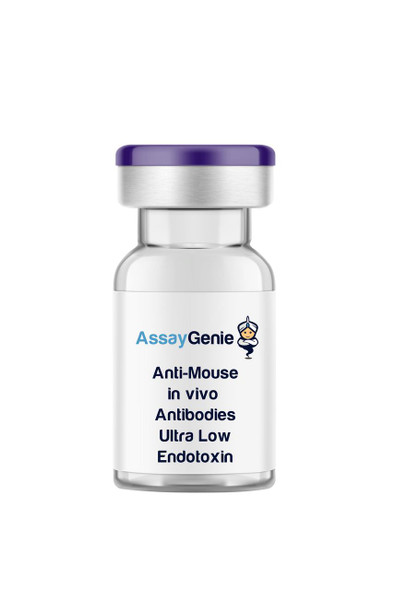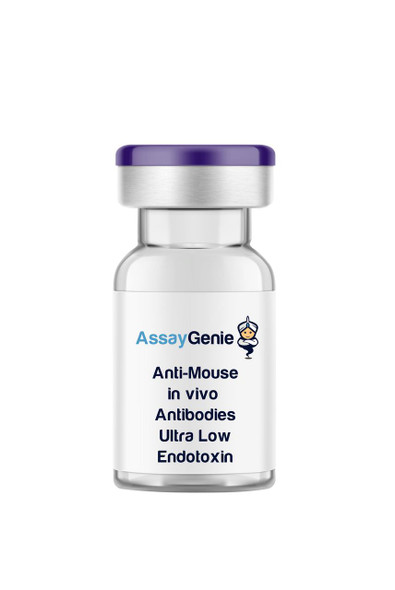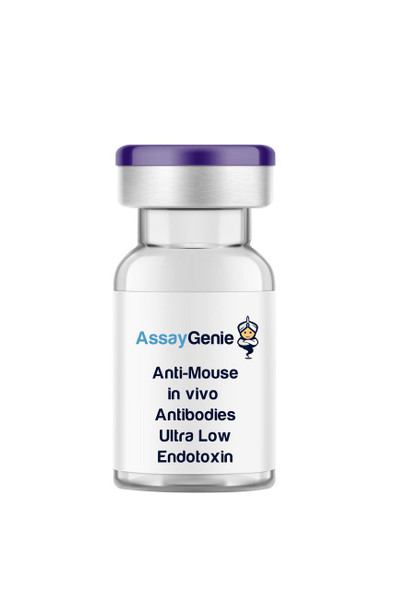Anti-Mouse CD3ε [145-2C11] In Vivo Antibody - Ultra Low Endotoxin
- SKU:
- IVMB0059
- Product Type:
- In Vivo Monoclonal Antibody
- Clone:
- 145-2C11
- Protein:
- CD3-epsilon
- Isotype:
- Armenian Hamster IgG
- Reactivity:
- Mouse
- Synonyms:
- CD3
- T3
- Research Area:
- T Cell Depletion
- Endotoxin Level:
- Ultra Low Endotoxin
- Host Species:
- Armenian Hamster
- Applications:
- Act
- Blocking
- CODEX
- CyTOF
- Depletion
- FA
- FC
- ICC
- IF
- IHC FF
- WB
Frequently bought together:
Description
system_update_altTechnical Datasheet
| Product Name: | Anti-Mouse CD3ε [145-2C11] In Vivo Antibody - Ultra Low Endotoxin |
| Product Code: | IVMB0059 |
| Size: | 1mg, 5mg, 25mg, 50mg, 100mg |
| Clone: | 145-2C11 |
| Protein: | CD3-epsilon |
| Product Type: | Monoclonal Antibody |
| Synonyms: | CD3, T3 |
| Isotype: | Armenian Hamster IgG |
| Reactivity: | Mouse |
| Immunogen: | H-2Kb-specific mouse cytotoxic T lymphocyte clone BM10-37 |
| Applications: | Act, B, CyTOF®, Depletion, FA, FC, ICC, IF, IHC FF, PhenoCycler®, WB |
| Formulation: | This monoclonal antibody is aseptically packaged and formulated in 0.01 M phosphate buffered saline (150 mM NaCl) PBS pH 7.2 - 7.4 with no carrier protein, potassium, calcium or preservatives added. |
| Endotoxin Level: | ≤ 0.5 EU/mg as determined by the LAL method |
| Purity: | ≥98% monomer by analytical SEC >95% by SDS Page |
| Preparation: | Functional grade preclinical antibodies are manufactured in an animal free facility using only In vitro protein free cell culture techniques and are purified by a multi-step process including the use of protein A or G to assure extremely low levels of endotoxins, leachable protein A or aggregates. |
| Storage and Handling: | Functional grade preclinical antibodies may be stored sterile as received at 2-8°C for up to one month. For longer term storage, aseptically aliquot in working volumes without diluting and store at -80°C. Avoid Repeated Freeze Thaw Cycles. |
| Applications: | Act, B, CODEX®, CyTOF®, Depletion, FA, FC, ICC, IF, IHC FF, WB |
| Recommended Usage: | FC The suggested concentration for this 145-2C11 antibody for staining cells in flow cytometry is ≤ 1.0 µg per 106 in a volume of 100 µl. Titration of the reagent is recommended for optimal performance for each application. |
| Reactivity: | Mouse |
| Host Species: | Armenian Hamster |
| Specificity: | Clone 145-2C11 recognizes an epitope on mouse CD3-epsilon. |
| Antigen Distribution: | CD3-epsilon is primarily expressed on mature T cells and NK-T cells and at different levels on differentiation-dependent thymocytes. |
| Immunogen: | H-2Kb-specific mouse cytotoxic T lymphocyte clone BM10-37 |
| Concentration: | ≥ 5.0 mg/ml |
| Endotoxin Level: | ≤ 0.5 EU/mg as determined by the LAL method |
| Purity: | ≥98% monomer by analytical SEC >95% by SDS Page |
| Formulation: | This monoclonal antibody is aseptically packaged and formulated in 0.01 M phosphate buffered saline (150 mM NaCl) PBS pH 7.2 - 7.4 with no carrier protein, potassium, calcium or preservatives added. |
| Preparation: | Functional grade preclinical antibodies are manufactured in an animal free facility using only In vitro protein free cell culture techniques and are purified by a multi-step process including the use of protein A or G to assure extremely low levels of endotoxins, leachable protein A or aggregates. |
| Storage and Handling: | Functional grade preclinical antibodies may be stored sterile as received at 2-8°C for up to one month. For longer term storage, aseptically aliquot in working volumes without diluting and store at -80°C. Avoid Repeated Freeze Thaw Cycles. |
CD3ε is a 20kDa subunit of the TCR complex and is a transmembrane T-cell surface glycoprotein that belongs to the Ig superfamily. It is one of five polypeptide chains that form the TCR complex by associating with the CD3δ, γ and ζ chains, in addition to the TCR α/β or γ/δ chains. CD3 is involved in TCR signaling, enumeration of immunocompetent T-lymphocytes in peripheral blood, and signal transduction during antigen recognition.
| Technical Datasheet: | View |
| Protein: | CD3-epsilon |
| Ligand/Receptor: | Peptide antigen/MHC-complex |
| Research Area: | Immunology |

| Armenian Hamster IgG Isotype Control | |
|---|---|
| Clone | PIP |
| Isotype | Armenian Hamster IgG1 |
| Endotoxin Level | Ultra Low Endotoxin |

![Anti-Mouse CD3ε [145-2C11] In Vivo Antibody - Ultra Low Endotoxin Anti-Mouse CD3ε [145-2C11] In Vivo Antibody - Ultra Low Endotoxin](https://cdn11.bigcommerce.com/s-39x6lpnvxv/images/stencil/608x608/products/119807/117990/anti-mouse-cd3e-145-2c11-in-vivo-antibody-ultra-low-endotoxin__35831__14333.1698937720.jpg?c=1)
![Anti-Mouse CD3ε [145-2C11] In Vivo Antibody - Low Endotoxin Anti-Mouse CD3ε [145-2C11] In Vivo Antibody - Low Endotoxin](https://cdn11.bigcommerce.com/s-39x6lpnvxv/images/stencil/590x590/products/119806/117989/anti-mouse-cd3e-145-2c11-in-vivo-antibody-low-endotoxin__34505__44190.1698937720.jpg?c=1)
![Anti-Mouse CD3ε [500A2] In Vivo Antibody - Ultra Low Endotoxin Anti-Mouse CD3ε [500A2] In Vivo Antibody - Ultra Low Endotoxin](https://cdn11.bigcommerce.com/s-39x6lpnvxv/images/stencil/590x590/products/119899/118082/anti-mouse-cd3e-500a2-in-vivo-antibody-ultra-low-endotoxin__27280__27271.1698937766.jpg?c=1)
![Anti-Mouse CD3ε [500A2] In Vivo Antibody - Low Endotoxin Anti-Mouse CD3ε [500A2] In Vivo Antibody - Low Endotoxin](https://cdn11.bigcommerce.com/s-39x6lpnvxv/images/stencil/590x590/products/119898/118081/anti-mouse-cd3e-500a2-in-vivo-antibody-low-endotoxin__03215__98398.1698937765.jpg?c=1)





